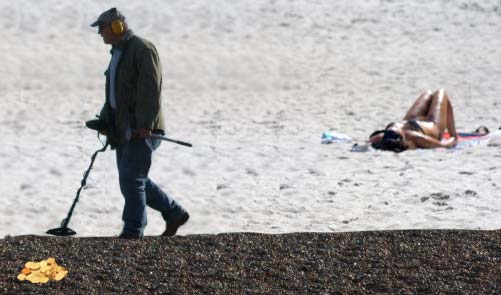 Blue Berg Strand… Milnerton… Sea Point… Clifton… Muizenberg… Macassar… Somerset-Strand… Gordon’s Bay…
Blue Berg Strand… Milnerton… Sea Point… Clifton… Muizenberg… Macassar… Somerset-Strand… Gordon’s Bay…
To you, those famous beaches in and around Cape Town may evoke the long, lazy days of summer holidays.
To the bidorbuyer Pierre_Henri (aka Pierre Nortje), those very same beaches are a mini gold mine.
Literally. Over the years, he and his fellow metal detector hobbyists have unearthed (pardon, un-sanded) plenty of coins and jewellery by scouring the beaches of Cape Town.
“I used to keep track of all my finds when I started detecting in 1997. After finding 25,000 coins in a few short years, I lost interest in the bookkeeping exercise. However, I remember that I averaged about 40 gold rings and about 100 silver rings a year”, says Pierre in an article he is writing for a Canadian treasure hunting magazine, which he shared with other bidorbuyers on the Forum.
Pierre kindly allowed us to post excerpts about his fascinating hobby in this blog, including these crucial tips for would-be metal detectorists:
- If it is jewellery you are after, you must venture under the water. For every gold ring Pierre finds on the beach, his friend Andy finds four or five under the water. In spite of that, Pierre – a Scuba diver himself – prefers to stick to the beaches. The moral being: it’s not the value, it’s the pleasure you get out of it that counts; that’s why it’s called a hobby.
- If you are like Pierre, note that the best time to prospect the beaches for coins and jewellery (and possibly an occasional bottle cap) is not when all the tourists are there, in summer. The most productive period is the winter, when the pounding winds and waves sweep away the top layers of sand to bring the buried treasures closer to the top. Pierre says that on many a cold, windy Saturday morning he and his fellow hobbyists – about twenty of them – would score two or three gold rings each. (Do your own maths, but take our word, that’s a lot of gold rings.)
When Pierre started detecting in 1997, there were only about ten Capetonian detectorists. Over the past decade, their number grew to the (still modest) twenty or so dedicated hobbyists. Every now and then, their ranks are swelled by the overseas enthusiasts, from England, the USA, and France.
Apart from its obvious benefits (like fostering the healthy, active, open-air lifestyle), this hobby has at least one more advantage: when you go for a stroll on the beach equipped with your metal detector, you need not bother taking any money for a cool drink or a sandwich. The chances are, you’ll find enough coins to see you though the day.









